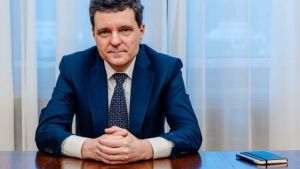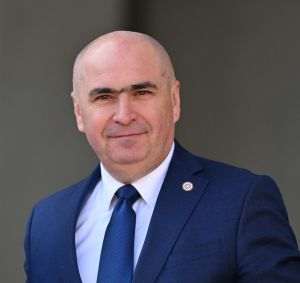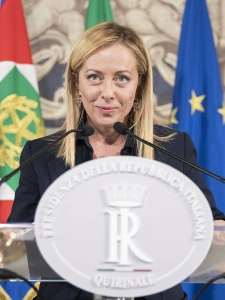From this point forward, the Romanian economy can only go up, according to Mugur Isarescu, Governor of the National Bank of Romania. However, the pace remains unknown. "We should be concerned with the quality of the growth in order to avoid going back to the same problems," he said.
Romania will resume economic growth starting in Q3, or Q4 at the latest, on a quarter-to-quarter basis, Governor Isarescu announced. "If we judge by the industrial output, the economy has already started picking up and is currently recovering. We started from (-)12% and we are now at (-)6, notwithstanding the fact that the figures become available with a delay of at least two months," he said.
• Foreign deficit sustainable at 8% of GDP if foreign investments reach 5-6% of GDP
The current account deficit could become sustainable at 8% of the GDP, but only if foreign investments reach 5-6% of the GDP, in addition to the structural funds attracted by Romania, Governor Isarescu added.
• The crisis was both a trigger and an accelerator of current account deficit adjustments
An increasing current account deficit is hard to avoid, considering the cyclic pattern of capital inflows, Mugur Isarescu said. In his opinion, temptation was extremely great, considering that the country went through an international cycle of capital abundance and then scarcity. "It would have been very hard to avoid an increase in the current account deficit in the last four years," he said.
The deterioration of the current account deficit could have been mitigated, if certain unsustainable trends in the private sector - such as salary growth above productivity and a very strong lending surge - had been counteracted by prudence in the public sector.
A change in the investors" perception of Romania accelerated such adjustments, Governor Isarescu added. "The crisis is both a trigger and an accelerator of adjustments," he said. "To us, at the National Bank, it was no surprise that the ebb followed. However, it is also true that the National Bank underestimated the magnitude of this adjustment," he said.
Looking at the economic growth, we could say that we are having quite a hard landing. Governor Isarescu believes that we will see further adjustments of the economic growth rate and the industrial output. However, in his opinion, "if we look at the unemployment rate, it doesn"t look like a hard landing."
• National Bank governor, too optimistic about European fund absorption
Progress in attracting European funding was below the minimum estimated by the National Bank, Governor Isarescu admitted. He believes that all efforts must be channelled towards European funding as "Romania will repay the 20 billion euro we borrowed from the international institutions from the 30 billion euro we should take from the European Union." However, it will be very hard to secure such an amount, as it is formed of tens of thousands of small projects, which are hindered by bureaucracy and legal gridlock.
• Romania, a credibility importer
A country should export credibility and face hardship with proof of capability to act, but Romania imported credibility by turning to the international financial institutions, Governor Isarescu noted. In his opinion, the authorities did what they should have done, considering the ongoing economic crisis. The financing agreement with the international financial institutions is meant "to compensate for the lack of generosity of the private capital owners."
• Banks, too cautious
Romanian banks are overreacting to the current economic context, being excessively prudent with their customers, so more flexibility on their part would be quite necessary, according to National Bank Governor Mugur Isarescu. He warned that, when banks decided to start helping their customers, it could be too late.
In Isarescu"s view, banks also exaggerated before the crisis, when they were inviting customers to take "instant loans" by simply showing their ID, as recently as September 2008. Consequently, the rupture between economic performance before and after the fourth quarter of 2008 was extremely abrupt.
• Euro convergence process, still achievable
Romania must join the EuroZone in 2014, as per the existing roadmap, but a budget deficit below 3% of the gross domestic product is one of the mandatory conditions. The EuroZone convergence process is still possible, but only through a major shift of focus from the inflation rate and the interest rates to the public deficit, National Bank Governor Mugur Isarescu said. In his opinion, the unsustainable breakdown of budget spending is top priority.
25 Bln RON credit lines become due before year-end
Savings in Romania could drop 50%, unless the banks renew the 25 billion RON credit lines that become due before the end of the year, according to BNR representative Florian Neagu, who presented a report titled "Aspects of the Saving Process In Romania" and co-authored by the National Bank of Romania (BNR), the Romanian Deposit Guarantee Fund and the Romanian Centre of Economic Policies.
"If the banks do not agree to reschedule these credit lines, companies will have to settle them using their deposits and maybe their current cash flows," Neagu explained. Such course of events could make it difficult for companies to pay their business partners and suppliers, generating a significant chain impact in the real economy.
• 10% of the households make over 70% of the total savings
The aforementioned report indicates that 10% of the Romanian households generate over 70% of the total value of the savings in the country, whereas approximately 50.4% of the households do not make and have never made any savings. Further on, only households with a total monthly income of 2,500 RON or more have a higher probability of saving money.
Representatives of the Romanian Deposit Guarantee Fund added that the saving probability did not differ according to age groups, although a survey made by the National Statistics Institute in 2006 had revealed that persons below 25 years of age saved more money than those between 25 and 45 years of age.
The research conducted by the Romanian Deposit Guarantee Fund indicates that the saving probability is higher if the head of the family is unemployed, whereas a survey released by the National Statistics Institute claimed that the probability increased not only in the scenario presented by the Fund, but also if the head of the family was self-employed, or a farmer, a pensioner or a business owner. However, the saving probability is lower if the household is run by a woman, the source indicated.
Of the approximately 1,600 respondents interviewed by the Romanian Deposit Guarantee Fund, 70% prefer to keep their savings in the national currency, while 16.8% opt for a foreign currency. Persons with a lower level of education tend to prefer saving national currency, while university graduates opt for a foreign currency. The survey also indicates that the saving probability is higher if the household is located in Bucharest, where investment options are more diverse.
S.C.
•
The latest forecast aligned between Romanian authorities and the International Monetary Fund (IMF) indicates a massive contraction of the foreign deficit this year to approximately 5.5% of the GDP from over 12% of the GDP last year. The previous forecast indicated a current account deficit of 7.5% of the GDP in 2009.
The Government"s budget deficit forecast, aligned with the International Monetary Fund, is 7.3% of the GDP for this year.
Romania"s current account deficit plunged a historical 73.3% in the first half of 2009, compared to the corresponding period of 2008, reaching 2.37 billion EUR.























































